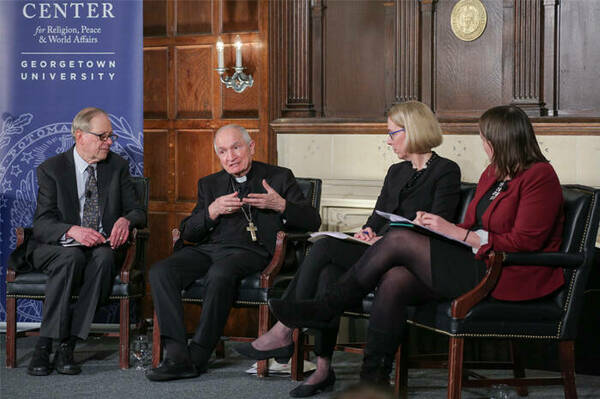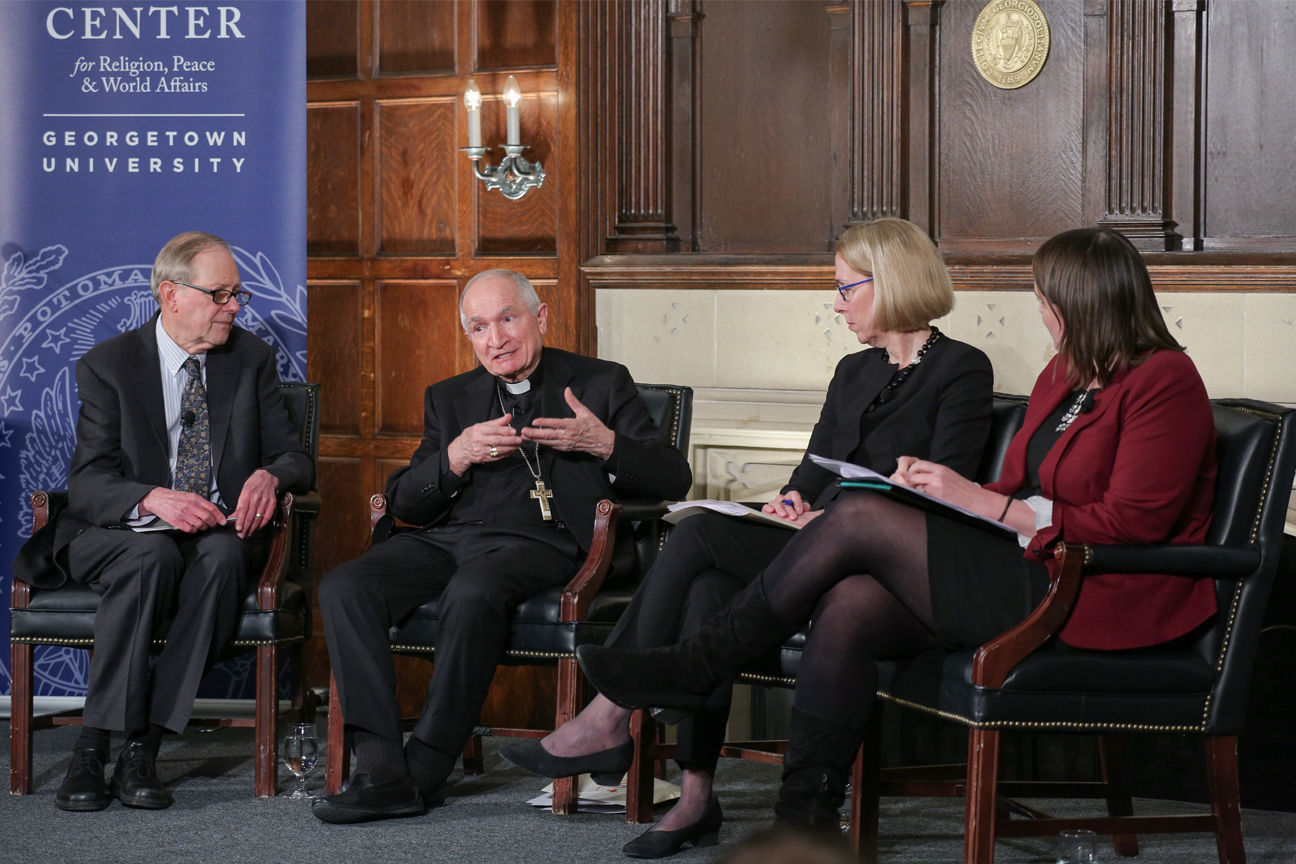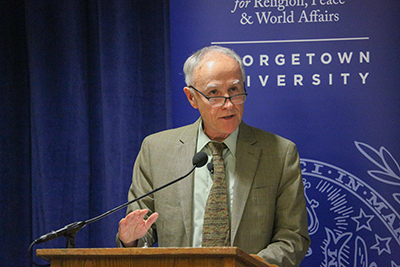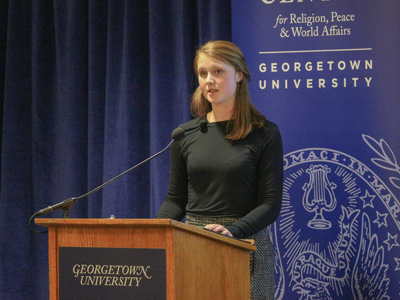

Panelists at Thursday’s lecture included (from left to right) James Timbie, an Annenberg Distinguished Visiting Fellow at the Hoover Institution, Archbishop Silvano Tomasi, Joan Rohlfing, president and chief operating officer of the Nuclear Threat Initiative (NTI), and Kelsey Davenport (M.A.’11), director for nonproliferation policy at the Arms Control Association. Photo: Berkley Center
This article was adapted from a piece by Henry Brill at the Berkley Center for Religion, Peace and World Affairs. Read the original story »
On January 30, the Kroc Institute for International Peace Studies and the Catholic Peacebuilding Network were among the co-sponsors of a lecture by Archbishop Silvano Tomasi on the Catholic Church and nuclear disarmament. The lecture took place at Georgetown University’s Berkley Center for Religion, Peace, and World Affairs.
Joan Rohlfing, president and chief operating officer of the Nuclear Threat Initiative (NTI), and James Timbie, an Annenberg Distinguished Visiting Fellow at the Hoover Institution, gave responses to the lecture. Rohlfing and Timbie then joined the archbishop for a conversation moderated by Kelsey Davenport (MA ‘11), director for nonproliferation policy at the Arms Control Association.
The event was followed by a daylong workshop on Friday, January 31, entitled “The Pope and the Bomb: Beyond Deterrence.” The workshop is tied to a forthcoming book that considers the policy and pastoral implications of the Church’s evolving position on nuclear deterrence and disarmament.
Deterring Nuclear Deterrence
“For the Church, disarmament concerns find inspiration first of all in the gospels,” said Archbishop Tomasi, a key advisor to Pope Francis on nuclear issues. “Matthew states that Peter was immediately admonished by Jesus with the famous words, ‘Put your sword back in its place. For all who draw the sword will die by the sword.’”In a lecture entitled, “Pope Francis’ Vision of Peace: Disarmament, Development, and Inclusiveness in the Catholic Conception of Just Peace,” Archbishop Tomasi analyzed the Church position on nuclear disarmament after Pope Francis denounced not only the use but also the very possession of nuclear weapons as immoral in November 2017.
The Vatican has translated that scriptural ethos into policy action, such as its support for the 2017 Treaty on the Prohibition of Nuclear Weapons. Support for the treaty is just one part of the Catholic approach to “integral disarmament,” a means to heal violence by building political and personal relationships.
Archbishop Tomasi highlighted the transformative potential of integral disarmament, remarking, “Through the promotion of human rights, integral disarmament can move us to transform a culture of injustice and violence to a culture of fraternal love that would take us beyond peace conventions and treaties to personal and communal conversion and change of heart.”
Effecting such widespread cultural and political change will not be easy, a reality the archbishop acknowledged.
“There is no illusion that the number of weapons will disappear as if by magic or after moral and legal condemnation,” stated Archbishop Tomasi. “Therefore, the Holy See is equally engaged in a step-by-step dialogue with nuclear-armed states whose commitment remains crucial to the achievement of any serious and realistic discussion of nuclear arms control.”
The Imperative of Education

David Cortright
Speakers during the Friday workshop included University of Notre Dame and Kroc Institute faculty members Gerard F. Powers, director of Catholic peacebuilding studies and coordinator of the Catholic Peacebuilding Network, speaking as part of a panel focused on ethics and pastoral guidance, and David Cortright, director of policy studies and the Peace Accords Matrix Project, speaking about the history of nuclear proliferation and the Catholic church’s engagement with nuclear policy.
Current Keough School Master of Global Affairs (MGA), International Peace Studies student Erin Connolly joined Margaret Pfeil, associate teaching professor of moral theology and Christian ethics at Notre Dame, for a conversation about public education around nuclear deterrence and arms control. Prior to entering the MGA program, Connolly worked at the Center for Arms Control and Non-Proliferation in Washington, D.C., trying to educate members of Congress on issues related to nuclear weapons.
“I was surprised at how little salience this issue has on Capitol Hill,” she wrote. “If members of Congress did not care, why were we expecting the public to?”
As a result, Connolly partnered with a friend at the Brookings Institute to found an education project to educate high school students about the basics of nuclear weapons and the need for non-proliferation. During the workshop, she drew on this work, which continues today through an organization called Girl Security that empowers high school girls to participate in national security debates.

Erin Connolly
Connolly found the Georgetown conference to provide an excellent primer on the theological and moral arguments for nuclear deterrence.
“I think the ability to use religious communities in the United States to spark more grassroots work is quite unique and valuable,” she says. “We can no longer look at nuclear weapons in their silo, but need to examine how this existential issue relates to the climate crisis and human rights. The next generation is already working on this and we should follow their lead. Nuclear weapons affect everyone, regardless of class, race, gender and location. We all have a stake in preventing their use.”
Advocating for Change
Action on nuclear disarmament is especially needed because nuclear deterrence strategy is dangerously outdated, according to Rohlfing.
“Today, the risk of nuclear use is not primarily driven by the failure to deter the intentional use of nuclear weapons,” said Rohlfing. “It is driven by cyberthreats, new technologies, increasingly sophisticated terrorist groups, and with nine nuclear states, a more complex global playing field.”
But the public has not expressed much concern about these new threats to nuclear security. That is where the Catholic Church can come into play, as Rohlfing sees it. She called for the Church to spark conversation on nuclear weapons from the grassroots level.
Next Steps
In a blog published by the Berkley Center following the week’s events, Powers spelled out the rationale for continuing the conversations percolating among attendees.

Panelists Drew Christiansen, Maryann Cusimano-Love, Gerard Powers,
and Alessio Pecorario
“While the pope, the U.S. bishops, a handful of policy experts and scholars, and jailed nuclear activists call for disarmament, most Catholics are otherwise occupied,” he wrote. “It is time to bring the nuclear issue back to the center of the Church by revitalizing and strengthening the voice of the Catholic community.”
He pointed to efforts by a coalition of organizations including the Kroc Institute, the Berkley Center, the U.S. bishops’ international policy office, and the Catholic Peacebuilding Network, with the support of the Nuclear Threat Initiative. Since 2014, through the Project on Revitalizing Catholic Engagement on Nuclear Disarmament, the group has been working to empower a new generation of Catholics to engage in nuclear issues and long-term work to ultimately eliminate nuclear weapons.
This summer, the group will host “Creating a World Without Nuclear Weapons,” a week-long seminar in Washington, D.C., for undergraduate and graduate students focused on revitalizing conversations about nuclear disarmament and deterrence.
This event was made possible, in part, by a generous grant from the Nuclear Threat Initiative. It was co-sponsored by the Initiative on Revitalizing Catholic Engagement on Nuclear Disarmament, a collaboration of the Kroc Institute, the Catholic Peacebuilding Network, and Georgetown University’s Berkley Center for Religion, Peace, and World Affairs. Additional co-sponsors included the International Federation of Catholic Universities, and Georgetown University’s Office of the President, Initiative on Catholic Social Thought and Public Life, and Center on National Security and the Law
Originally published by at kroc.nd.edu on February 14, 2020.